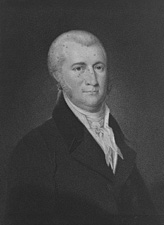James Asheton Bayard II
| James Asheton Bayard Sr. | |
|---|---|
 |
|
|
United States Senator from Delaware |
|
|
In office November 13, 1804 – March 4, 1813 |
|
| Preceded by | William H. Wells |
| Succeeded by | William H. Wells |
| Member of the U.S. House of Representatives from Delaware's At-large district |
|
|
In office March 4, 1797 – March 3, 1803 |
|
| Preceded by | John Patten |
| Succeeded by | Caesar A. Rodney |
| Personal details | |
| Born |
July 28, 1767 Philadelphia, Pennsylvania |
| Died | August 6, 1815 (aged 48) Wilmington, Delaware |
| Political party | Federalist |
| Spouse(s) | Ann (Nancy) Bassett |
| Parents | James Asheton Bayard Ann Hodge |
| Residence | Wilmington, Delaware |
| Alma mater | Princeton University |
| Profession | lawyer |
| Signature | |
James Asheton Bayard Sr. (July 28, 1767 – August 6, 1815) was an American lawyer and politician from Wilmington, in New Castle County, Delaware. He was a member of the Federalist Party, who served as U.S. Representative from Delaware and U.S. Senator from Delaware.
Bayard was born in Philadelphia, Pennsylvania, son of Dr. James Asheton Bayard and Ann Hodge. The Bayards descended from a sister of Dutch Director-General Petrus Stuyvesant and came to Bohemia Manor, Cecil County, Maryland in 1698. Upon the premature death of his parents, the younger James went to live with his uncle, Colonel John Bubenheim Bayard, in Philadelphia. He graduated from Princeton College in 1784, studied law under General Joseph Reed and Jared Ingersoll, was admitted to the Delaware Bar in 1787, and began a practice in Wilmington, Delaware. Bayard married February 11, 1795, Ann or Nancy Bassett, the daughter of wealthy Delaware lawyer and U.S. Senator Richard Bassett. They had six children, Richard, Caroline, James Jr., Edward, Mary, and Henry M. and lived on the southwest corner of 3rd and French Street in Wilmington.
Bayard was first elected to the U.S. House of Representatives in 1796, and served there for three terms, from March 4, 1797 until March 3, 1803. While in the U.S. House "he was distinguished as an orator and constitutional lawyer and became a leader of the party in the house." He especially distinguished himself as one of the managers appointed in 1798 to conduct the impeachment proceedings against William Blount, a U.S. Senator from Tennessee. Blount was accused of inciting the Creeks and Cherokees to help the British take New Orleans from the Spanish. While the U.S. House impeached him, under Bayard's leadership, the United States Senate dropped the charges in 1799 on the grounds that no further action could be taken beyond his dismissal. This set an important precedent for the future with regard to the limitations on actions which could be taken by U.S. Congress against its members and former members.
Bayard also played an important part in the U.S. presidential election of 1800. With the vote tied in the Electoral College, it was a group of Federalists led by Bayard who broke the deadlock by agreeing to allow the election of Thomas Jefferson by the House of Representatives. When it seemed the Federalists were about to vote for Aaron Burr, Bayard is believed to have followed the advice of Alexander Hamilton and persuaded his Federalist colleagues to abstain from voting. It was also believed he struck a deal with the incoming Jefferson, to refrain from the wholesale removal of Federalists from appointed positions. The young Bayard enlisted Representative Samuel Smith (Maryland) to deal with Jefferson on Federalist control of the Philadelphia and Wilmington custom offices. While that was never proved, Jefferson allowed the Federalist office holders to remain employed.
...
Wikipedia
